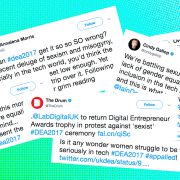Why educational software providers need to reduce the data neediness of their apps
The Covid-19 lockdown and distance learning for school children has brought light to the flaws in technology in our society.
This was especially apparent when we started online school. My siblings and I experienced really bad, slow running Wi-Fi and so did many other students alongside our teachers. This meant we couldn’t easily use the software provided as it required a higher bandwidth of internet than was available to those of us using it.
I am going to explore why Google and other companies should try to reduce the amount of bandwidth required to run their programs. This will help reach a wider audience and allow people in poorer or less developed countries like Egypt, (who have with an average download speed of 2MB/s) and Paraguay (average of only 1.4MB/s) better access to educational resources while learning from home.
Reducing the barriers to learning will enable progress for all
Lower bandwidth requirements will help school children in more far-flung communities using vital educational tools from their homes. For example, the average internet speed in Egypt, Namibia, Bolivia, Venezuela and Paraguay are all below 3MB/s. This means for a video call – where the ideal bandwidth is an upload speed of 3.2MB/s and an inbound speed of 2.6MB/s – children will experience incredibly grainy video, poor quality sound and a large delay, making it very hard to learn and interact in an online classroom. This situation worsens when you consider that for calls with 10 participants or more, you’re recommended to have an inbound speed of 4.0MB/s.
I experienced this myself during my class calls with 26 people. It was really frustrating! It makes me worry that people with even worse internet would not be able to work or learn very easily if we went into another crisis and has highlighted the importance of companies making software bandwidth usage requirements much lower.
I experienced a lot of stress during online school due to my location. We just did not have good Wi-Fi and so it would lead me to hand in work after the lesson due to loading times as well as having a large audio and picture delays during the lesson.
My personal experience of using Google Meet was with a friend who lives in an area where the Wi-Fi is rubbish. They complained hourly about the bad image and audio quality he had, which made me consider how hard it would be to learn if we had to continue like this in September and the possibility of it leading to more serious educational gap issues. I ask, why should someone’s education suffer because of where they live?
Take lessons from Gaming providers
Interestingly, in comparison to educational applications, most gaming apps developed for mobile devices are made for low bandwidth. Video game companies have tried their best to reduce their bandwidth to allow a wider audience to access their games. During the quarantine, we had very little to do. It consisted of board games, Facetiming, school, exercise and that’s it… There was no going out to see friends, no going to the park for a walk, no going to the movies or other activities. It made playing video games a real lifeline for pleasure.
But if you don’t have a good internet connection it means you can’t use a gaming console or laptop to play multiplayer games. To overcome this my brother and I started playing a new mobile game called Call of Duty: Mobile. This game didn’t have amazing graphics, gameplay, mechanics or anything else in particular, the only thing this game had going for it that others didn’t was that it could run very well on super low bandwidth. This led to loads of people in a similar situation getting hooked on the game too. It really makes you think that if CoD; Mobile can do it, why can’t Google?
I don’t think it is fair that as a society we can leave out people who don’t have access to a higher standard of Wi-Fi because of their geographical location. Covid-19 lockdown tech usage demonstrated the data-hungry nature of today’s apps. It highlighted a digital divide between the haves and have nots of broadband. And this brings me to conclude that while there is a constant drive to increase bandwidth around the world, with 5G and more fibre connections, what we really need is software developers to decrease the neediness of their applications.
How is it fair that the people living on the remote edges of society can’t use educational applications (not to mention pleasure apps to use in your free time)? Google and other educational software providers must address this, and they can learn from the gaming industry. The software doesn’t need to be elaborate and fancy, it just needs to be usable, with a clear and fast audio and visual connection. The fact is no matter how advanced the software, it is useless if the internet speeds required to effectively use it are out of reach for many.






